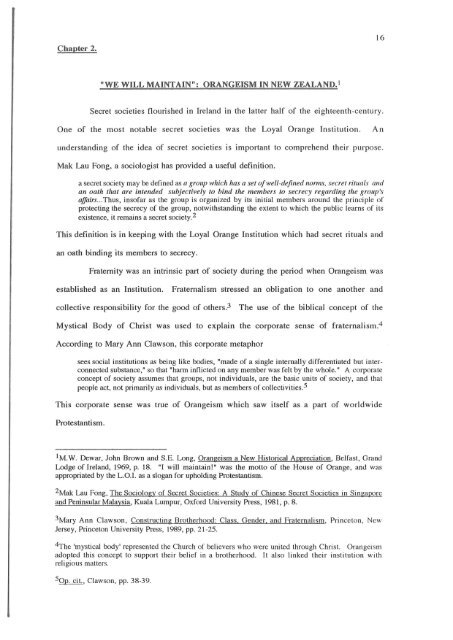TRANSPLANTED IRISH INSTITUTIONS - University of Canterbury
TRANSPLANTED IRISH INSTITUTIONS - University of Canterbury
TRANSPLANTED IRISH INSTITUTIONS - University of Canterbury
Create successful ePaper yourself
Turn your PDF publications into a flip-book with our unique Google optimized e-Paper software.
Chapter 2.<br />
16<br />
"WE WILL MAINTAIN": ORANGEISM IN NEW ZEALAND.l<br />
Secret societies flourished in Ireland in the latter half <strong>of</strong> the eighteenth-century.<br />
One <strong>of</strong> the most notable secret societies was the Loyal Orange Institution.<br />
An<br />
understanding <strong>of</strong> the idea <strong>of</strong> secret societies is important to comprehend their purpose.<br />
Mak Lau Fong, a sociologist has provided a useful definition.<br />
a secret society may be defined as a group which has a set o/welL-defined nonllS, secret rituals alld<br />
an oath that are intended subjectively to bind the members to secrecy regarding the group's<br />
affairs ... Thus, ins<strong>of</strong>ar as the group is organized by its initial members around the principle <strong>of</strong><br />
protecting the secrecy <strong>of</strong> the group, notwithstanding the extent to which the public learns <strong>of</strong> its<br />
existence, it remains a secret society.2<br />
This definition is in keeping with the Loyal Orange Institution which had secret rituals and<br />
an oath binding its members to secrecy.<br />
Fraternity was an intrinsic part <strong>of</strong> society during the period when Orangeism was<br />
established as an Institution.<br />
Fraternalism stressed an obligation to one another and<br />
collective responsibility for the good <strong>of</strong> others. 3<br />
The use <strong>of</strong> the bi blical concept <strong>of</strong> the<br />
Mystical Body <strong>of</strong> Christ was used to explain the corporate sense <strong>of</strong> fraternalism. 4<br />
According to Mary Ann Clawson, this corporate metaphor<br />
sees social institutions as being like bodies. "made <strong>of</strong> a single internally differentiated but interconnected<br />
substance," so that "hann inflicted on any member was felt by the whole." A corporate<br />
concept <strong>of</strong> society assumes that groups, not individuals, are the basic units <strong>of</strong> society, and that<br />
people act, not primarily as individuals, but as members <strong>of</strong> collectivities. 5<br />
This corporate sense was true <strong>of</strong> Orangeism which saw itself as a part <strong>of</strong> worldwide<br />
Protestantism.<br />
lM.W. Dewar, John Brown and S.E. Long, Orangeism a New Historical Appreciation, Belfast. Grand<br />
Lodge <strong>of</strong> Ireland, 1969, p. 18. "I will maintain!" was the motto <strong>of</strong> the House <strong>of</strong> Orange, and was<br />
appropriated by the L.0.!. as a slogan for upholding Protestantism.<br />
2Mak Lau Fong, The Sociology <strong>of</strong> Secret Societies: A Study <strong>of</strong> Chinese Secret Societies in Singapore<br />
and Peninsular Malaysia, Kuala Lumpur, Oxford <strong>University</strong> Press, 1981, p. 8.<br />
3Mary Ann Clawson. Constructing Brotherhood: Class. Gender. and Fraternalism, Princeton, New<br />
Jersey, Princeton <strong>University</strong> Press, 1989, pp. 21-25.<br />
~he 'mystical body' represented the Church <strong>of</strong> believers who were united through Christ. Orangeism<br />
adopted this concept to support their belief in a brotherhood. It also linked their institution with<br />
religious matters.<br />
SOp. cit.. Clawson, pp. 38-39.
















